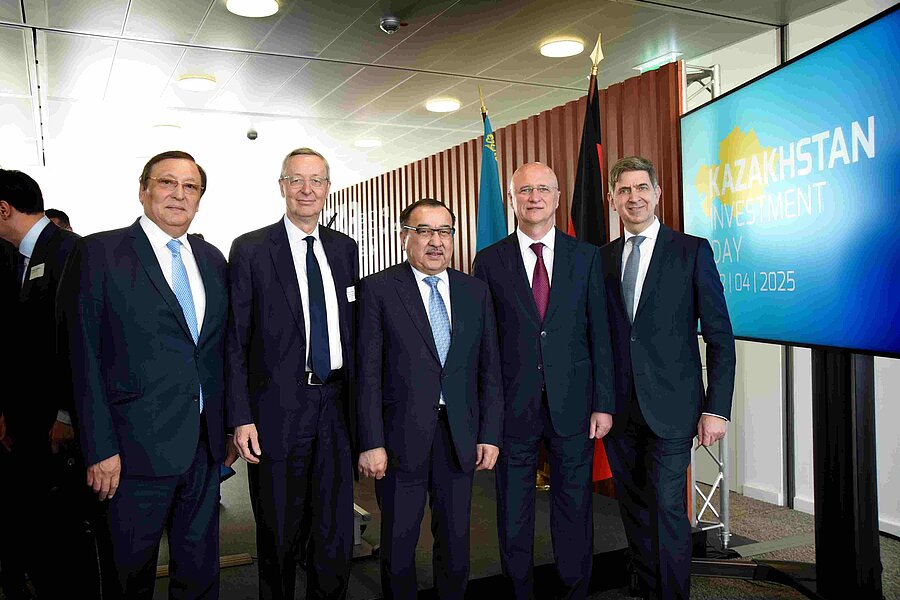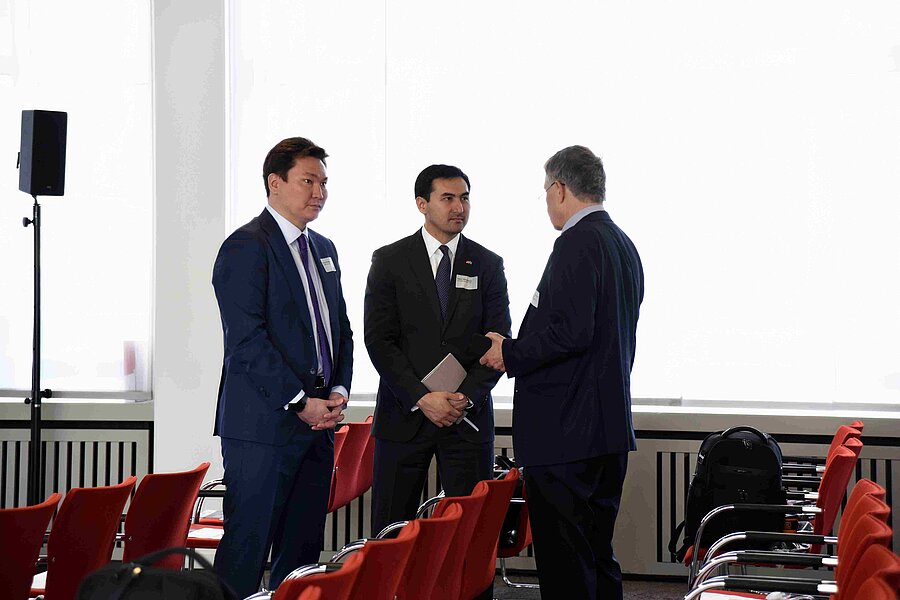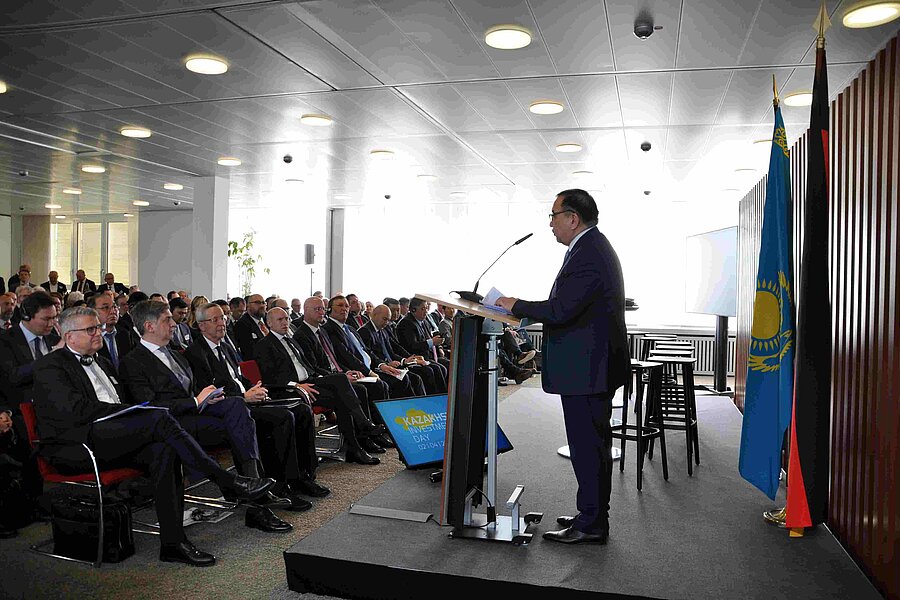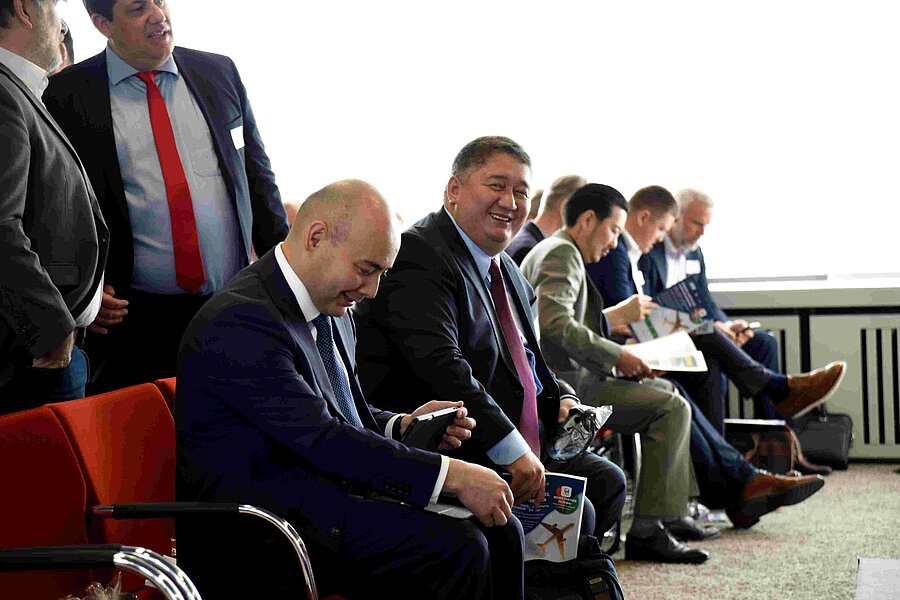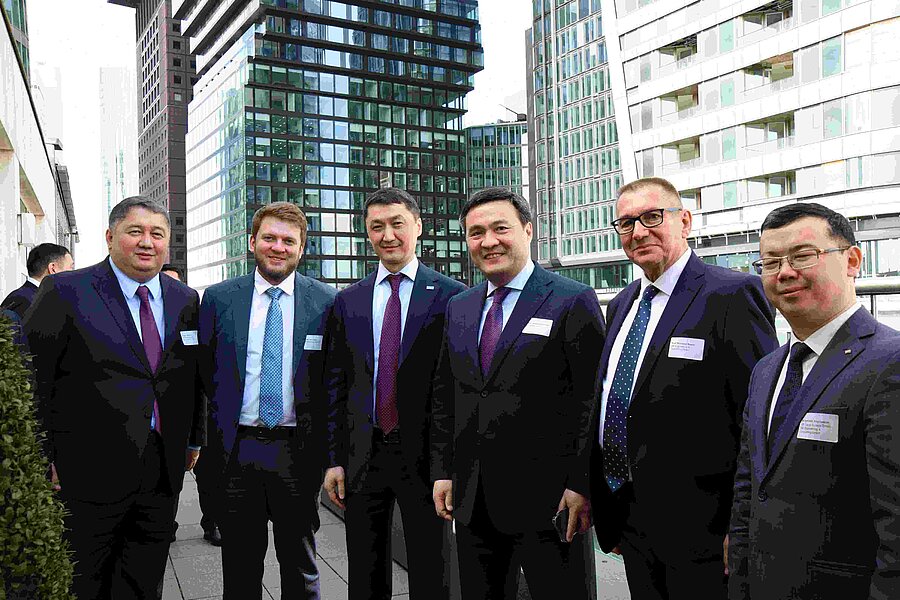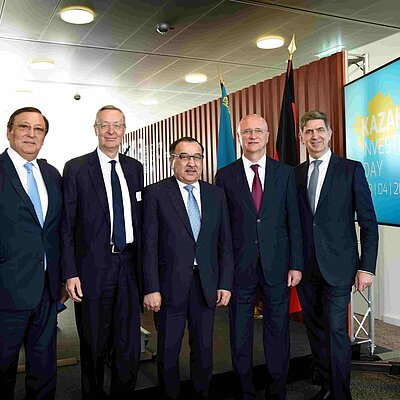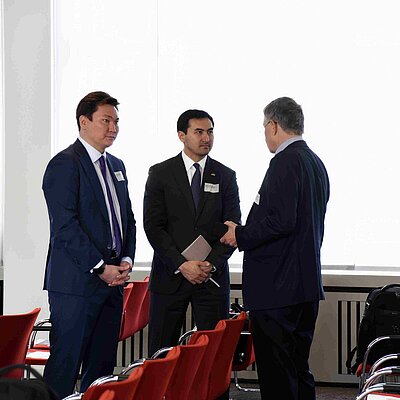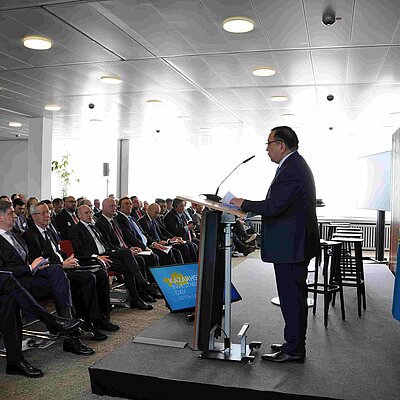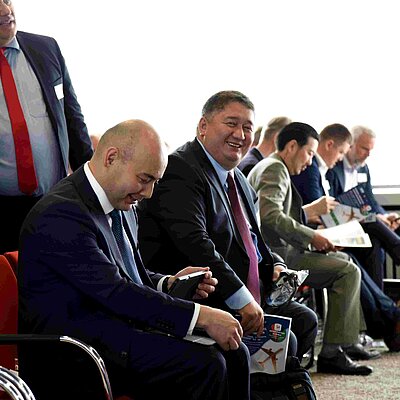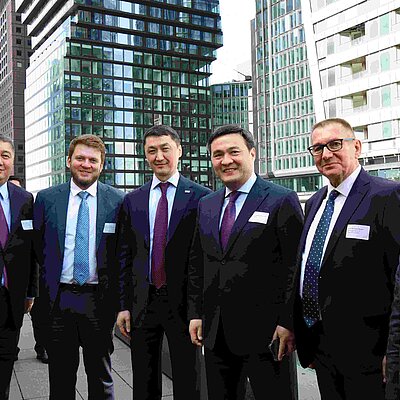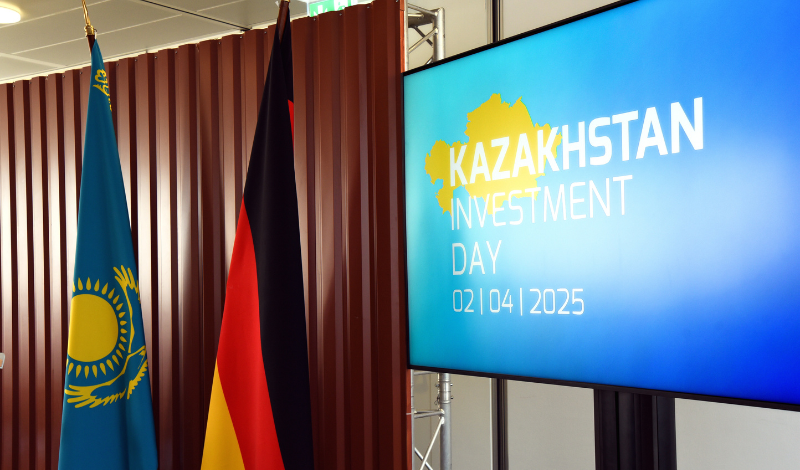
14 April 2025
Numerous representatives from trade, business and politics at Kazakhstan Investment Day 2025
On 2 April, more than 180 guests from trade, business and politics met at AKA Bank for the Kazakhstan Investment Day 2025. The event was jointly organised by the Embassy of the Republic of Kazakhstan in Berlin, Kazakh Invest and the Ost-Ausschuss der Deutschen Wirtschaft e. V. Kazakhstan was represented by Deputy Prime Minister Roman Sklyar, Deputy Foreign Minister Alibek Kuantyrov and Ambassador Dr Nurlan Onzhanov. The Minister for Federal and European Affairs, Manfred Pentz, travelled to Frankfurt City on behalf of the State of Hesse.
Political relations provide a stable framework for a successful economy
Roman Sklyar, Deputy Prime Minister of Kazakhstan, and Alibek Kuantyrov, Deputy Foreign Minister, travelled to Frankfurt with a large business delegation to present their country's growth potential to German investors.
In his keynote speech, Sklyar spoke of a "new stage" in bilateral relations, characterised by openness and understanding. There are currently 1,100 companies with German capital operating in Kazakhstan, and the proportion of SMEs continues to grow. There is growing interest in investment, particularly in raw materials and critical minerals.
Kazakhstan plays a key role in logistics, providing security and stability in times of increasing geopolitical unrest as a central corridor for international flows of goods. In 2022, goods throughput by land amounted to 1.5 million tonnes, doubling compared to the previous year – and in the long term, up to 10 million tonnes is conceivable, says Sklyar. Kazakhstan is also establishing itself as a container hub by expanding its port facilities on the Caspian Sea and its freight fleet.
According to Deputy Prime Minister Sklyar, the third important advantage of Kazakhstan as a business location is its human resources. He emphasised the importance of Germany's local involvement, which includes not only the transfer of technology but also of expertise. The result is the qualified training of skilled workers who are then available to the labour market.
Dr Nurlan Onzhanov, Ambassador of the Republic of Kazakhstan to Germany, referred to the dynamic relationship between the two countries, which has been strengthened in recent years by visits from German President Frank Walter Steinmeier, German Chancellor Olaf Scholz and German business delegations. With economic growth of 5 % last year and a stable credit rating, Ambassador Onzhanov said that the positive economic development of Kazakhstan, which is an important partner for Germany in the desired transport transition and digital transformation due to its raw materials, was evident.
In his welcoming address, the Hessian Minister for Federal and European Affairs, International Affairs and Bureaucracy Reduction, Manfred Pentz, emphasised the state's interest in further developing existing economic relations with Kazakhstan, which he described as a "player" in Central Asia. Pentz referred to the excellent and consistently reliable relations that have existed since 1992, which serve as an example of positive cooperation between countries, even in a world in transition.
Michael Harms, CEO of the Committee on Eastern European Economic Relations, highlighted the projects already initiated together with the Deputy Prime Minister of the Republic of Kazakhstan in the German-Kazakh Business Council. He thanked AKA Bank for organising and hosting the Kazakhstan Investment Day 2025, which is increasingly becoming a platform for exchange between Germany and the Central Asian region.
Kazakhstan's Deputy Foreign Minister, Alibek Kuantyrov, presented the country as a consistently stable partner for German companies, with continuous efforts being made to improve the investment climate. As a result, $15.7 billion will be invested in new projects in Kazakhstan in 2024 alone, with the medium-term goal of creating high-value production clusters.
Practical examples and expert insights on investing in the emerging market of Kazakhstan
Two subsequent panels highlighted the entry options and opportunities for German investors. Moderated by Marck Wengrzik, CEO of AKA Bank, the participants of the panel ‘Kazakhstan as an opportunity market - Investments and financing options’ presented financial instruments and solutions for companies looking to position themselves in Central Asia.
Yerzhan Yelekeyev, Chairman of the Board of Kazakh Invest, highlighted the country's advantages as a location in the region, which aims to double its economic growth by 2029. As part of the Eurasian Economic Union, the aim is to develop not only quantitatively but also qualitatively, for example in agricultural processing and mechanical engineering.
Farhat Kasimov, Investment Director of the International Financial Centre Astana, used the English common law to explain the ease of market entry for foreign companies. This makes it possible to establish themselves in Central Asia under the same framework conditions as in the domestic environment. After physical registration in the AFC, production can be set up throughout Kazakhstan. Timur Onzhanov, Deputy Chairman of the Board of Directors of Baiterek Holding, described the role of Baiterek, which as a development institution has a wide range of financial instruments at its disposal and offers project structuring. It is particularly active in the agricultural and social housing sectors.
Herwig Maaßen, Senior Manager at PwC Germany, spoke about investment security and risk protection, describing investment guarantees as a "door opener" for countries. Demand is growing steadily, even for the US at the moment. Michael Geske, Senior Underwriting Manager CIS at Euler Hermes, added that Kazakhstan (category 5) is in the middle range.
Stefan Scholz, Managing Partner of Scholz von Gleich, has more than 20 years of experience in the Kazakh market. The agricultural market in particular, with its geo-strategic position in Central Asia, has growth potential.
According to Ekaterina Galitsyna, Head of Eastern Europe, Central Asia and South Caucasus, KfW IPEX-Bank, investors can optimise their market entry opportunities by combining all the instruments presented on the panel. Networking and a thorough knowledge of all the options are important factors for success on the ground.
Success factors for exporters include strong infrastructure and local training
Vladimir Nikitenko, Regional Director for Central Asia at the Committee on Eastern European Economic Relations, discussed the conditions and opportunities for local companies in the field of procurement and logistics with his fellow panelists on the topic of "Raw material supply and logistics for the development of new markets". The panel discussed aspects such as long distances, extreme temperature differences and connectivity requirements in the Central Asian region from a business perspective.
Dr Uwe Knotzer, Managing Partner of the Knauf Group, which has been active in Kazakhstan for 27 years, gave an impressive account of the company's commitment to education and training in the country. The company has trained 35,000 skilled workers in its training centres, for example in the field of dry construction. But the Knauf Group brings not only craftsmanship but also design and other know-how to Kazakhstan.
Focus on Kazakhstan: Critical raw materials and infrastructure attract investors
For Dennis Schwindt, CEO of HMS-Bergbau, the Central Asian region is "top of the list" for exporters. Looking ahead, the further development of railway lines and increased local processing of critical minerals are important issues. Nariman Absametov, CEO of state-owned Tau-Ken Samruk, highlighted the potential of critical minerals for investors, which will significantly accelerate the growth of the industry. Tau-Ken Samruk is investing in more than 50 mining projects in Kazakhstan with around 15 partner companies.
Deputy Transport Minister Talgat Lastaev outlined the government's plans for infrastructure development, pointing to the planned digitalisation of rail transport, which will allow seamless tracking of freight. Rail capacity to China is to be increased from the current twelve to over 60 freight trains, and a cooperation agreement has been signed with Chinese Railways. Significant investment will also continue in shipping and aviation. Trade via the Central Corridor is the safest freight route and, with an average transit time of around 25 days, is significantly faster than the unsafe sea route, which takes around 50 days.
Dr Dirk Notheis, CEO of Rantum Capital Management GmbH, which finances investments by German companies in Kazakhstan, highlighted the country's increasing competition and growing connectivity. All transport routes will continue to be increasingly used in the future - the aim for companies remains to further optimise costs.
Kazakhstan Investment Day 2025: Exchange, insights and new business perspectives
The practical presentations of the panelists gave the guests a comprehensive overview of the framework conditions and opportunities for investors in Kazakhstan.
Afterwards, all participants had the opportunity to network and exchange ideas on the summer terrace or to withdraw for confidential discussions.
Together with the Embassy of the Republic of Kazakhstan in Berlin, the Ost-Ausschuss der deutschen Wirtschaft e. V. and Kazakh Invest, we are pleased to have reached such a large audience at the Kazakhstan Investment Day 2025 and hope to make many new business contacts through this business platform.
